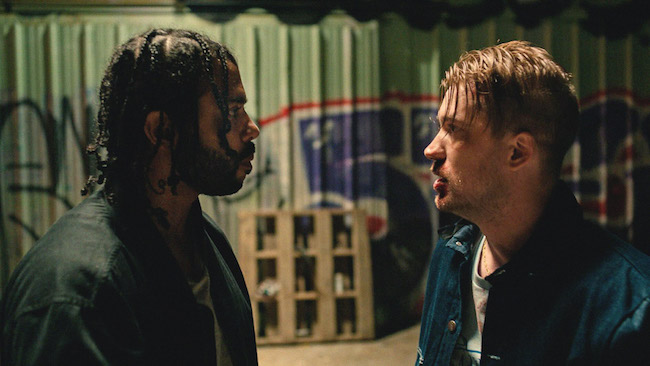
Critics of Blindspotting — the debut film from director Carlos López Estrada that just kicked off the 2018 Sundance Film Festival — might say it’s too preachy at times. That it wears its heart on its sleeve and keeps driving its point home about cops killing black people over and over again. These observations aren’t entirely off-base, but there’s a reason Blindspotting does this – because people obviously aren’t getting it. And that’s the point, because in reality people keep saying the same thing, and nothing seems to change. I certainly don’t blame Blindspotting for wanting to drive that point home, because people don’t seem to be listening yet.
And now after all that, can you believe that Blindspotting is actually pretty funny?
Blindspotting gets its title from the effect of seeing one thing, and completely missing something else that’s always there. (As an example the film uses the ol’ “Is it a vase or is it two faces looking at each other?” illusion.) Collin (Daveed Diggs) has three days left on the year of probation he’s serving for setting a hipster on fire. (It’s a long story, but it involves a flaming fancy specialty drink.) And there are a lot of hipsters around because this is the new gentrifying Oakland, a theme that’s ever-present throughout the film as the old Oakland slowly disappears. And Collin is doing everything to stay out of trouble these last three days, which offers a never-ending tension as we know something is going to happen to screw this up for him.
That something happens when Collin is driving home and witnesses an Oakland police officer shoot a black man in the back four times. With no questions asked, the police tell Collin to get out of there and he obliges, knowing he’s a few minutes past his 11pm county-set curfew. For the rest of the film, Collin is haunted by the images of seeing a man murdered in the street. But he also knows that if he reports what he saw, there’s no way he’s not going back to jail for being past curfew.
(I promise, there’s a lot more humor in this movie than you’d ever expect. Wayne Knight is in this movie.)
Collin’s other problem is his best friend, Miles (Rafael Casal), a homegrown Oakland white kid who pontificates maybe a bit too much in his desire to prove he’s from the real Oakland. In other words, he’s prone to getting the pair in trouble. And as people point out to Collin, when they do get in trouble, Miles isn’t going to be the one that the police shoot. And Miles isn’t the one on probation.
Blindspotting is a movie with a lot on its mind. The film is filled with imagery from the Black Lives Matter movement, always haunting Collin as he just tries to make it through these last three days of probation. Diggs is incredible as Collin, a vehicle of empathy and kindness and humor who is so, so close to bursting with rage. Throughout the film he will break into rhymes, and by the end we see that rage, focused through a laser-precise rap, as the three days of living with the visions of a murdered man catch up with him in a scene so intense, I can’t imagine I’ll be seeing another one like it at this festival.
And just like that, Carlos López Estrada is a filmmaker to watch. It’s easy to be hyperbolic at a film festival like this, so to be clear, there are a few choices in this film I suspect Estrada probably won’t make, say, three more films from now. But at this point right now, who cares? This is a movie bursting with raw, untamed emotion. Estrada has something to say and, by God, he’s going to say it. And, yes, he says it a few times in Blindspotting. And, even so, he probably knows that people still aren’t going to listen.
You can contact Mike Ryan directly on Twitter.






